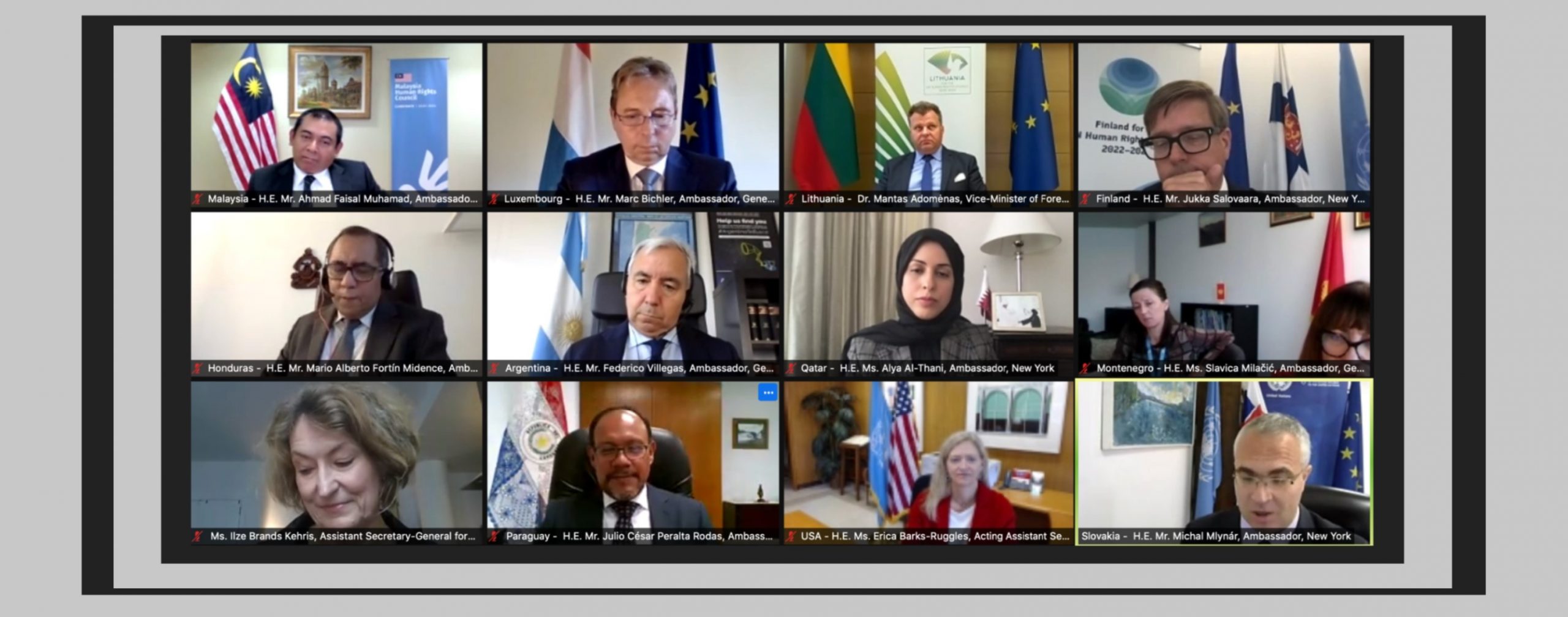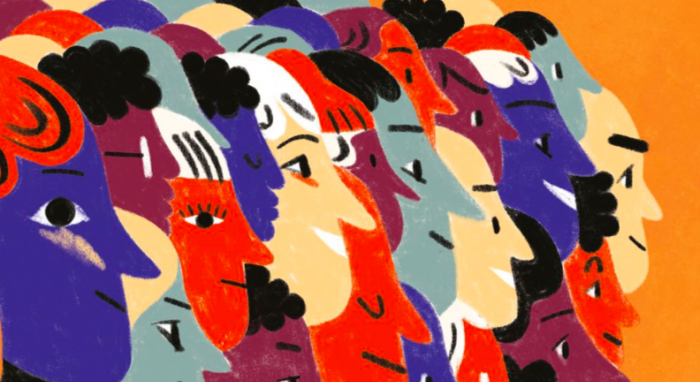In advance of the Human Rights Council elections that will take place this autumn for the membership term 2022-2022, Amnesty International and the International Service for Human Rights held an online pledging event for candidate States on 8 September 2021.The Pledging Event provides a critical opportunity for civil society to directly and constructively engage with candidate States for the Human Rights Council, the chief UN body examining protection and promotion of human rights.
The goal of the Pledging Event is to enhance transparency and accountability in Human Rights Council elections and improve adherence to Council membership standards. It is intended to give candidates an opportunity to present their visions for Council membership and to respond to questions from a range of stakeholders on how they propose to realise the pledges and commitments made in seeking election. State representatives, civil society, national human rights institutions and other key stakeholders are invited to participate in the event and pose questions to candidates. This was the second time the event was held online enabling greater participation and access, irrespective of geographical location.
Closed slates presented in all regions
Elections to the Human Right Council are often not as competitive as we would hope. Unfortunately, closed slates are very common, and this year was no different. We are dismayed that this year All regional groups presented closed slates, assuring all candidates in those slates a seat on the Council. We call on all regions to reconsider this practice in the future, and ensure competitive slates as a matter of principle.
Candidates committed to transparency, dialogue and accountability
Ten of the eighteen candidates that were invited joined the event participated in the discussion, namely: Qatar and Malaysia (from the Asia and the Pacific Group); Argentina, Paraguay and Honduras (from the Latin America and the Caribbean Group); Luxembourg, Finland and the USA (from the Western Europe and Others Group); and Lithuania and Montenegro (from the Central and Eastern Europe Group).
The eight countries that declined to attend the event included Benin, Cameroon, Eritrea, The Gambia, Somalia (from the Africa Group); and Kazakhstan, India and the United Arab Emirates (from the Asia and the Pacific Group).
We were disheartened that ultimately no candidate from the Africa Group participated, despite Cameroon confirming participation prior to the event, they did not show up to the event. We were also disappointed that less than half of the candidates from the Asia Pacific region were willing to participate in the discussion, with the United Arab Emirates pulling their participation at the very last minute. The decision of these States not to participate is concerning, and suggests a lack of commitment to participate in global efforts to enhance transparency, dialogue and accountability.
Responses by candidate States
All candidate States were asked what they hope to achieve through their Human Rights Council membership – both at national and international level. Candidate States were also asked general as well as country-specific questions from the audience.
During the event, candidate States provided a range of commitments, as well as responses to questions asked, including commitments to cooperate with and support participation of independent civil society with the Council in the context of additional barriers for civil society participation during COVID-19. Other responses included:
- Argentina noted that as they continue to adapt to COVID-19, including through promoting global vaccine access and equity, they must ensure measures do not disproportionately or discriminatorily impact civil society or marginalized groups.
- Finland, in addition to highlighting its plan to prioritise the rights of women and other marginalized communities, along with a commitment to review blasphemy laws, Finland welcomed input on how it could better support and protect human rights defenders through its embassies on the ground.
- Honduras pledged to engage and cooperate with civil society and States from all regions, in response to concerns raised by civil society regarding enforced disappearances, arbitrary detentions, and killings of human rights defenders.
- Lithuania emphasized a commitment to move toward the recognition of same-sex civil unions, acknowledging civil society concerns about laws which may promote or enable discrimination.
- Luxembourg highlighted the protection of human rights defenders, sustainable development, and equality for LGBTI persons as priorities for their membership.
- Malaysia confirmed its support for a human rights-based approach to climate change and for a new Special Rapporteur mandate on Climate Change and Human Rights
- Montenegro pledged to cooperate closely with civil society, to promote ways to prevent violations, and to combat discrimination against LGBTI persons.
- If elected, Paraguay’s top priority would be improvements on the ground, which they note as an important measure of the Human Rights Council’s efficacy. This would include ensuring the right to self-determination for Indigenous peoples.
- In response to questions on restrictions on the establishment & operations of CSOs, Qatar committed to strengthening its cooperation with civil society and looking to increase protection of women, girls, people with disabilities, as well as migrant workers.
- While the United States expressed concerns that the Council agenda has a permanent standing item on Israel/OPT, it confimed its plans to strive for a more just country, and world, by engaging with civil society in an effort to address issues including systemic racism and discrimination against LGBT persons and women and girls.
Questions were also raised for candidate States that declined to participate.
- The UAE was asked when its authorities will release Abdulsalam al-Marzooqi, Ahmed Mansoor, Mohammad al-Roken, and Nasser bin Ghaith, along with the many other human rights activists and citizens that continue to endure unjust imprisonment.
- Cameroon was asked to outline measures taken to ensure national investigations and accountability for allegations of intimidation and reprisals against human rights defenders for their cooperation with the UN. The latest 2020 UN annual report on reprisals (A/HRC/45/36) includes allegations of reprisals against 5 human rights defenders and one journalist in the country.
- In respect of Eritrea’s repeated refusal to engage with key UN rights mechanisms, including with the UN Special Procedures on Eritrea, in blatant disregard of council membership obligations, Eritrea was asked how this would change if re-elected?
- Kazakhstan has made claims that it is pursuing a human rights agenda, yet serious restrictions on free speech, assembly, & association persist, with government critics being convicted & increasingly jailed on overbroad criminal charges. In this regard, Kazakhstan was asked whether a seat on the Council will change this approach
- Somalia was asked whether it would pledge to pass during the first year of membership legislation around sexual offences which hamper the fight against widespread sexual violence?
Any questions posed during the event that were not ultimately asked of the candidate States have been shared with those candidate States in letters. The complete list of questions for candidate States can be found here: Argentina, Benin, Cameroon, Eritrea, Finland, Honduras, India, Kazakhstan, Lithuania, Luxembourg, Malaysia, Montenegro, Paraguay, Qatar, Somalia, The Gambia, UAE, and USA. We expect candidate States to send written responses before the election on 14 October 2021. To date, only Finland, Luxembourg, Lithuania and Montenegro have provided answers.
The event was generously co-sponsored by Australia, Cote d’Ivoire and Slovakia, with financial support from Australia. It was moderated by Ilze Brands Kehris, UN Assistant Secretary-General for Human Rights.
For more information concerning the upcoming Human Rights Council election, view ISHR scorecards which offer a quick ‘at-a-glance’ overview of the candidates’ relationship with UN human rights mechanisms including their cooperation with the Council, their support for civil society, their engagement with UN treaty bodies and Special Procedures, among others.



